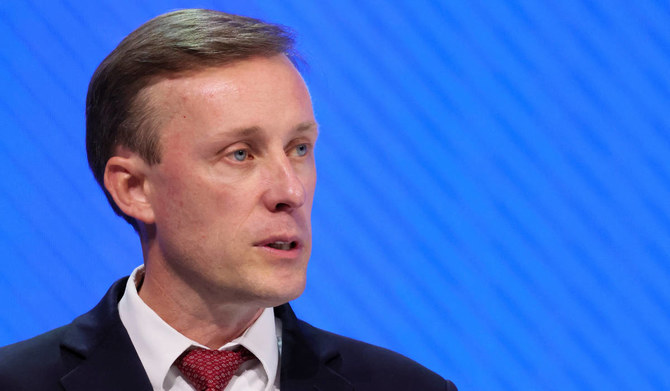WASHINGTON: A senior White House official said Tuesday that addressing the ongoing threat by Yemen’s Houthi rebels on commercial vessels in the Red Sea is an “all hands on deck” problem that the US and allies must address together to minimize impact on the global economy.
“How long this goes on and how bad it gets comes down not just to the decisions of the countries in the coalition that took strikes last week,” White House national security adviser Jake Sullivan said during an appearance at the World Economic Forum in Davos, Switzerland.
The Iran-backed Houthi group has launched dozens of attacks since November on vessels in the Red Sea, a vital corridor for the world’s shipping traffic, in what they say is an effort to support Palestinians in the war with Israel. US and British forces have responded by carrying out dozens of air and sea strikes on Houthi targets in Yemen since Friday. The attacks by the Houthis have continued.
The Red Sea attacks have already caused significant disruptions to global trade. Oil prices have edged higher in recent days, though Brent crude futures were down slightly in early trading Tuesday. Tesla last week announced it would temporarily halt most production at its German factory because of attacks in the Red Sea.
The US launched a new strike against the Houthis on Tuesday, hitting anti-ship missiles in the third assault on the Iranian-backed group in recent days. The strike came as the Iranian-backed Houthis claimed responsibility for a missile attack against the Malta-flagged bulk carrier Zografia in the Red Sea. No one was injured.
Sullivan said it was critical that countries with influence on Tehran and other Middle East capitals make it clear “that the entire world rejects wholesale the idea that a group like the Houthis can basically hijack the world.”
President Joe Biden’s senior adviser acknowledged that the Houthi attacks in the Red Sea as well as groups allied to Iran carrying out attacks in Lebanon, Syria, Iraq and Yemen pose concerns that the Israel-Hamas war could escalate even as Israeli officials have indicated a shift in intensity in their military campaign.
“We have to guard against and be vigilant against the possibility that in fact, rather than heading toward de-escalation, we are on a path of escalation that we have to manage,” Sullivan said.
The comments from Sullivan came after Qatar’s prime minister, Sheikh Mohammed bin Abdulrahman Al Thani, said during an appearance at the Davos forum that the situation in the Middle East is a “recipe for escalation everywhere.” He said Qatar believes that ending the conflict in Gaza will stop the Houthis and militant groups from launching attacks elsewhere in the region.
Sullivan on Tuesday met with Al Thani as well as Iraqi Prime Minister Mohammed Shia Al-Sudani and Iraqi Kurdish Prime Minister Masrour Barzani, according to the White House.
Iran fired missiles late Monday at what it said were Israeli “spy headquarters” in an upscale neighborhood near the sprawling US Consulate compound in Irbil, the seat of Iraq’s northern semi-autonomous Kurdish region, and at targets linked to the extremist Daesh group in northern Syria.
Iraq on Tuesday called the attacks, which killed several civilians, a “blatant violation” of Iraq’s sovereignty and recalled its ambassador from Tehran.

























